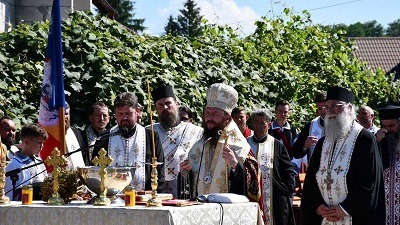
HG Bishop Damaschin blesses the first monument to anti-communist Resistance in Bucovina
Basilica News Agency – Ștefana Totorcea – 12/07/21
His Grace Damaschin of Dorna, Auxiliary Bishop to the Archdiocese of Suceava and Rădăuți, blessed on Thursday the first monument commemorating the anti-communist Resistance in Bukovina.
It is located in Vicovu de Jos, on the spot where Lt. Vladimir Macoveiciuc was shot by orders of the Soviets. He was the leader of the most important anti-communist Resistance group in Bucovina.
The blessing ceremony was attended by Abbot Melchisedec of Putna, Radu Ciuceanu, a survivor of the Pitești experiment and author of a study on the armed resistance in Bucovina, Irina-Loredana Stănculescu, General Consul of Romania in Cernăuți, Father Ionel-Constantin Maloș, Dean of Rădăuți, clerics and local officials.
The honouring of the national flag and the blessing of the monument were followed by a commemoration service for the volunteer peasant-soldiers who fought in the Regional Fixed Battalion Bucovina.
The Ceremonial Guard of “Prince Dragoș” 17th Alpine Hunter Battalion of Vatra Dornei and the Ceremonial Guard of “Prince Bogdan” Armed Police County Inspectorate of Suceava presented the honour accompanied by the Military Music of the “Podu Înalt” 15th Armoured Brigade of Iași.
Students from Romanian schools in Southern Bucovina (Suceava county) and Northern Bucovina (Chernovtsi Region, Ukraine) offered an artistic programme. The event concluded with a commemorative feast organized in the churchyard by respecting sanitary protection rules.
The symbolism of the monument
The monument was made by the “Arboroasa” Association’s Center for Protecting and Promoting Traditional Culture, with the support of Putna Monastery, of Rădăuți Deanery and of a citizens’ initiative committee from Vicovu de Jos.
The monument’s location is on the national road DN2H, by the bell tower of Vicovu de Jos’ “Pentecost” Orthodox Church.
The cross was sculpted at Putna Monastery and it faithfully reproduces a 19th-century wooden cross found at the UNESCO Church in Pătrăuți, Suceava county, which was founded by the Holy Prince Stephen the Great.
The 47 fence panels represent the fighters commanded by Lt. Vladimir Macoveiciuc. The other 6 special panels symbolize Vladimir Macoveiciuc’s family, victims of the communists’ repression.
The adjacent stone structure symbolizes a Table of Silence in heaven, where all the fighters of the Macoveiciuc group are seated. Some fell in combat, others were deported to Siberia.
A similar table made of naturally grown rock is to be found in the Pătrăuți churchyard and it is believed to have been the inspiration for Romanian sculptor Constantin Brâncuși’s Table of Silence.
Who was Vladimir Macoveiciuc
Vladimir Macoveiciuc was born on October 26, 1906, in the commune of Voitinel. His parents were Samson and Ioana. His mother became a young widow with three children. Macoveiciuc was not politically affiliated.
He was a merchant and, like a good military man, he was an army instructor charged with preparing young soldiers. He was pushed to join the armed Resistance by the abuse and crimes made by the Soviet military between March and September 1944.
The Regional Fixed Battalion Bucovina was a group of Romanian Resistance anti-communist partisans from Bucovina established by order of the Romanian Defence Staff on March 29, 1944.
Vladimir Macoveiciuc fought in Southern Bucovina until 1946. After August 23, 1944, he went underground together with some of his people, organizing the Resistance in the mountains.
Over 40 partisans are known to have been part of his group, but there must have been more. They were peasants from the communes of Voitinel, Gălănești, Hurjuieni, Vicovu de Jos and Vicovu de Sus, Horodnicu de Sus and Horodnicu de Jos.
The inauguration of the memorial was part of the Solemn Year of the pastoral care of Romanians outside Romania and the Commemorative Year of the reposed in the Lord; the liturgical and cultural value of cemeteries.
The goals of the project were to rediscover the village of Vicovu de Jos as a place of collective memory, to develop a culture of remembrance and to do so by involving the community in recollecting historical facts.

